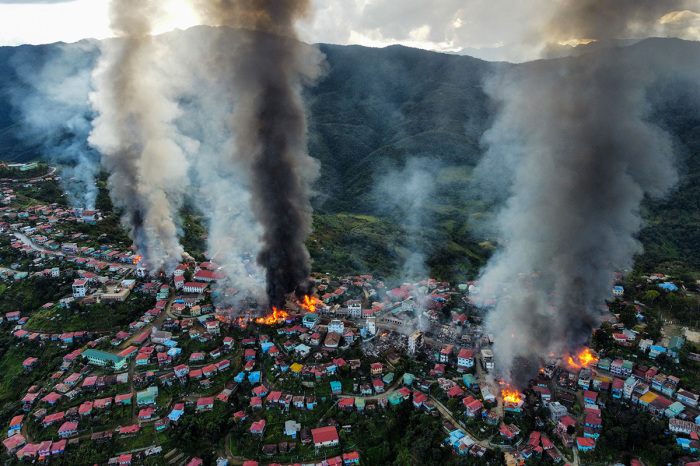US State Dept. condemns Burmese military over burning of 100 homes, churches in retaliatory attack

The U.S. State Department released a statement Sunday condemning the "gross violations of human rights" after Burmese security forces fired heavy artillery into a town in the predominantly Christian Chin state, setting at least 100 homes and two churches on fire. The attack was in retaliation after a Chin militia shot and killed a Burmese soldier who was breaking into houses and looting properties, according to a report.
In its statement, the State Department said the Burmese military must be held accountable:
The United States is gravely concerned by reports of gross violations of human rights that Burmese security forces have perpetuated in Chin State, including reports that forces have set fire to and destroyed more than 100 residences as well as Christian churches. We condemn such brutal actions by the Burmese regime against people, their homes, and places of worship, which lays bare the regime’s complete disregard for the lives and welfare of the people of Burma. These abhorrent attacks underscore the urgent need for the international community to hold the Burmese military accountable and take action to prevent gross violations and abuses of human rights, including by preventing the transfer of arms to the military.
We are also deeply concerned over the Burmese security forces’ intensification of military operations in various parts of the country, including in Chin State and the Sagaing Region. We call on the regime to immediately cease the violence, release all those unjustly detained, and restore Burma’s path to inclusive democracy.
We will continue to promote accountability for the horrific violence that has been and continues to be perpetrated by the regime against the people of Burma. We will continue to support the people of Burma and all those working toward a restoration of Burma’s democratic path and a peaceful resolution to the crisis.
Nearly 10,000 residents of the town of Thantlang fled the area as the fire raged on, the U.S.-based persecution watchdog International Christian Concern reported.
The Southeast Asian country’s military, locally known as Tatmadaw, started attacking Friday morning after the militia, Chinland Defense Force, killed a Tatmadaw soldier while he was looting properties.
The presence of the Buddhist nationalist military makes civilians and militias in conflict-ridden states nervous. The military has been accused of vandalizing places of worship and civilians’ homes, raping girls and women, abducting civilians to be used for forced labor and shooting civilians to death.
ICC quoted the India-based Chin Human Rights Organization as saying that several religious buildings, including Church on the Rock, Presbyterian Church, and a building attached to the Thantlang Baptist Church, the largest congregation in town, have also caught fire.
“The first rockets to be fired into the town landed at the entrances to the Thantlang Baptist Church,” ICC said.
Earlier this month, the military, which staged a coup on Feb. 1, attacked Rialti village near the Chin state’s capital of Hakha, Radio Free Asia reported at the time.
“We see this as a war crime because wherever they go, they focus on wherever there are large numbers of people — it’s a deliberate violation of religious freedom,” Salai Za Op Lin, CHRO’s deputy executive director, said at the time.
Op Lin noted that other Christian communities in Chin state had also been targeted since the military coup in February. “Now that the military has started a real operation in Chin state, we can expect a lot of such abuses and acts, and we urge the international community to keep a close eye on this.”
Last month, a beloved youth pastor, Cung Biak Hum of Thantlang Centennial Baptist Church, was shot dead as he tried to help one of his congregants save their burning home after it was set ablaze by the military during an attack on civilians in Chin state.
Information on his Facebook page showed that he was married with two sons and was pursuing a master's of divinity degree at MIT Yangon.
United Nations Special Rapporteur on Myanmar, Tom Andrews, highlighted the pastor’s murder in a tweet at the time, calling on the international community to “pay closer attention” to the “living hell” civilians have been experiencing there since a Feb. 1 coup brought back full military rule following years of quasi-democracy.
Myanmar’s ethnic minorities, including Christians, live in the various conflict zones across the country’s borders with Thailand, China and India. Hundreds of thousands of civilians, many of them Christians, have been displaced due to the escalation of conflicts in the zones since the coup.
Militias in those areas have been morally supporting pro-democracy protesters since the coup, which has led to the use of heavy weapons by the Burmese army. Thousands of civilians in the conflict zones have sought shelter in churches when their villages are under attack.
Christians make up just over 7% of the majority-Buddhist nation. Formerly known as Burma, the country is home to the world’s longest Civil War, which began in 1948. Myanmar is ranked No. 18 on Open Doors USA’s 2021 World Watch List of 50 countries where Christians face the most severe persecution. The persecution level in Myanmar is “very high” due to Buddhist nationalism. Burma is recognized by the U.S. State Department as a "country of particular concern" for egregious violations of religious liberty.
“The military is notorious for its relations with the ultranationalist ultra-Buddhist group the Ma Ba Tha,” ICC’s Southeast Asia Regional Manager, Gina Goh, said in a statement earlier this year. “The military together with Ma Ba Tha has targeted the Muslims in the country, but they also go after Christians. Once they get a hold of the power, they might resort to things they were doing before they passed the power to the civilian government. They kill. They rape minority Christians.”




























